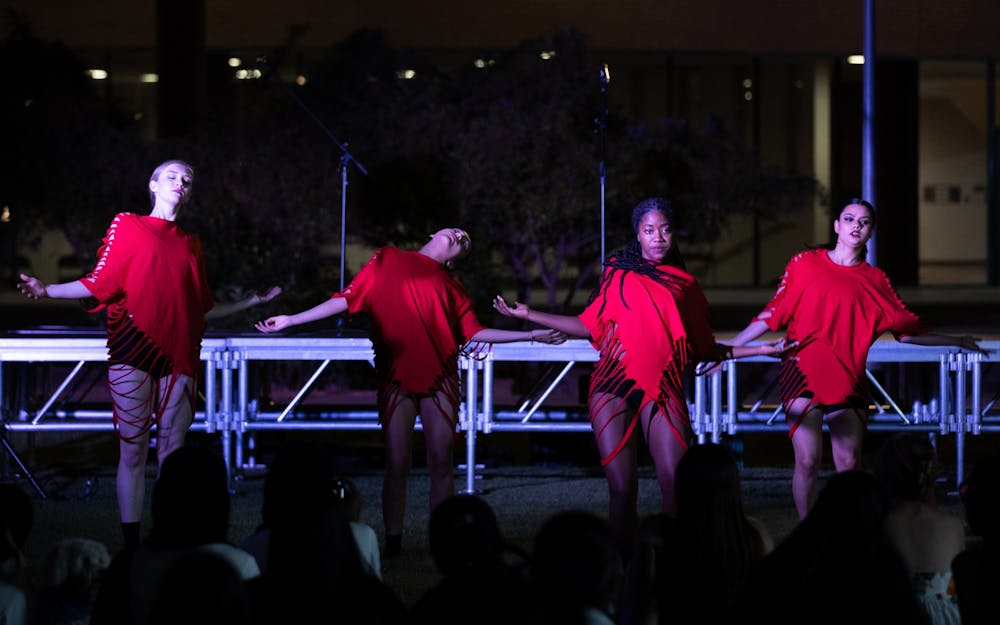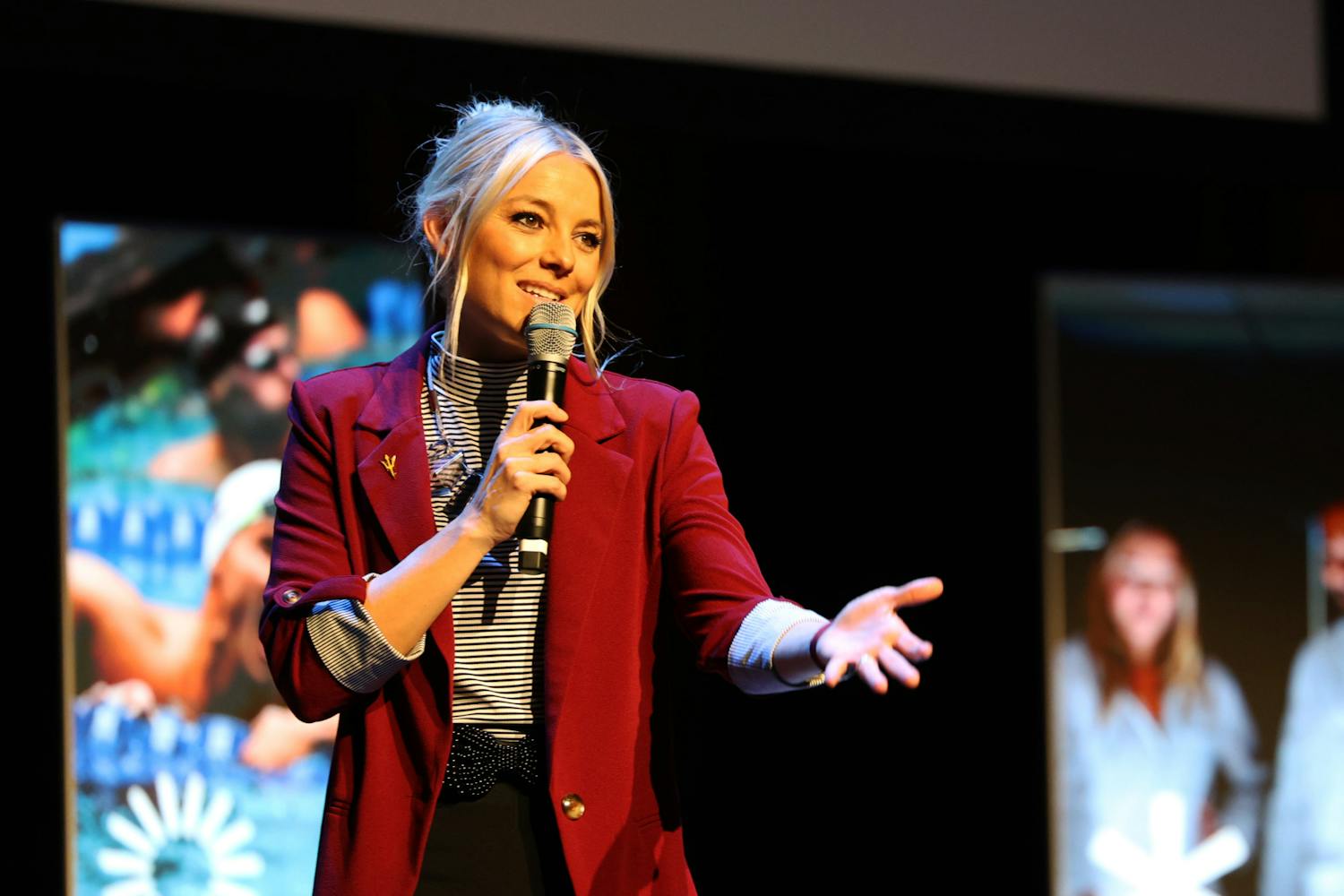The Council of Coalitions hosted its first-ever Take Back the Night Event on Thursday night on the Tempe campus to support and offer resources for survivors of sexual violence.
The event focused on the empowerment of survivors and prioritized their voices and stories through a keynote speaker, student performances and an open mic. The space provided to survivors to open up about their experiences promoted restoration and healing.
“Unfortunately, a lot of times, cases get swept under the rug," said Kelly Hashiro, a freshman studying global health and family and human development and an advocacy intern for the Women’s Coalition. "They're not given the justice that they deserve. A lot of people are scared to speak out because they know that they're going to be questioned intensely. It's really important that we create and continue to foster this safe space for survivors where we're like, ‘We see you, we believe you, and we're here to support you no matter what.’”
The in-person event functioned as a continuation of the virtual Take Back the Night Phoenix meeting hosted by La Frontera EMPACT Suicide Prevention Center from 5-7 p.m. the same day. The name of the event comes from the global charity organization Take Back the Night Foundation, which focuses on hosting awareness events that create safe communities and end all forms of sexual violence.
Studies have reported that there are disproportionately high amounts of sexual violence crimes against marginalized communities. A survey from the National Institute of Justice indicates that while almost 18% of white women and 7% of Asian and Pacific Islander women will be raped in their lifetimes, almost 19% of Black women, 24% of mixed race women, and 34% of American Indian and Alaska Native women will be raped during their lifetimes.
Additionally, one in two transgender individuals are sexually abused or assaulted at some point in their lives, according to the U.S. Office for Victims of Crime.
The coalitions at ASU collaborated on the event to recognize and address that sexual violence affects people of all racial, sexual and gender identities. The Council of Coalitions includes the Women's Coalition, the Accessibility Coalition, the Rainbow Coalition, El Concilio, the Alliance of Indigenous Peoples, the Asian/Asian Pacific American Students’ Coalition, the Black African Coalition and the Coalition of International Students.
"We wanted to have support from all the coalitions on campus because we recognize that this issue isn't just within women and female identifying individuals, it's across all ethnicities and all backgrounds," said Domenik Valdivia, a junior studying psychology and programming intern for the Women’s Coalition. "Anyone can experience this."
As attendees arrived, they were greeted with tabling by the Sexual and Relationship Violence Prevention Program, offering assistance and resources for those who experienced sexual violence. Representatives for “Here4U” were also present to explain the resource, an online decision aid to assist ASU students who have experienced sexual violence with seeking justice and support, to students.
ASU alumna Samantha Vrcic provided the keynote speech at the event. Her nonprofit, Path Matching, uses sexual assault prevention and anonymous reporting to make universities and other places safer. Vrcic is planning Arizona’s first-ever Sexual Assault Awareness Walk at Tempe Town Lake on April 16.
A sexual violence survivor herself, Vrcic is no stranger to the importance of community in the healing process.
“As survivors, we must come together and create trauma-informed communities,” Vrcic said, addressing the gathered crowd. “I am asking each and every one of you to meet with a group of friends or join a local nonprofit support group and talk about the hardships you have faced. We have to come together to heal and create these communities.”
Afterward, as the crowd gathered for a candlelight vigil with tea lights and phone flashlights in hand, co-president of the Women’s Coalition Mastaani Qureshi requested a moment of silence and reflection.
“Please let us take a moment to reflect on all the types and forms of sexual violence that occur around us to reflect on how we may be complicit in it, to reflect on how we are going to heal from it, and to reflect on how we're going to end this epidemic so future generations do not have to suffer like the previous generations and like we are suffering right now,” Qureshi said.
The candlelight vigil was followed by a performance by ASU acapella group The Undertones, a poetry reading by journalism major Emily Mai and a dance routine by the Dancers Society Downtown, and finished with an open mic event that allowed students a safe space to talk about their experiences.
Krush Sood, a senior studying journalism and president of the Dancers Society Downtown, knew she wanted the group to get involved with the event as soon as she learned about it. She hoped the team could provide healing for others through dance knowing it worked for her with her own experiences.
“A few of our members have had some experiences with sexual violence, myself included, and performance is a really good way to express all the different types of emotions that we've felt through the healing process,” she said. “My experience was years ago, but it's still something that affects me to this day. To be able to express it through dance is really important to me.”
Junior journalism major and slam poet Emily Mai said she has always used writing as a form of self-expression. After she went through her own experience with sexual violence, Mai turned to poetry to convey her emotions. By presenting her poetry at the event, she hoped to validate what other survivors may feel.
“When I was going through these things, I felt really alone, and I felt like no one understood how I felt," Mai said. "It was only when I started to talk to other people that had similar experiences that I realized, 'Oh my gosh, I'm not crazy for feeling this way.' I just want to show that it's safe and okay to feel some of those things, and it's okay to be scared.”
In her poem, titled “Three Years,” Mai shared the emotional turmoil and internal struggle that she faced after multiple experiences with sexual violence.
“I so badly wanted to control my own narrative," Mai said. "I so badly wanted to feel like I had a choice, a real choice. Well, for three years, I chose silence. That silence ends today.”
Reach the reporter at sabuggle@asu.edu and follow @sadie_buggle on Twitter.
Like The State Press on Facebook and follow @statepress on Twitter.

Sadie Buggle is the Editor of the State Press Opinion Desk. This is her third semester working for the State Press after two semesters reporting for the Community and Culture Desk.




